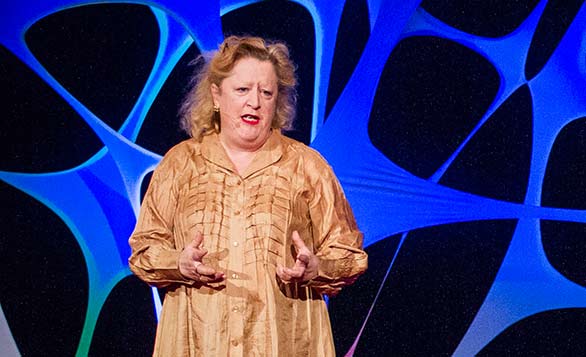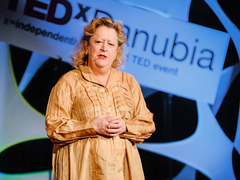
Margaret Heffernan speaks at TEDxDanubia about how we need the rare individuals who will speak up in the face of willful blindness.
Margaret Heffernan thinks deeply about what makes businesses work, and her answers are often surprising. At TEDGlobal 2012, she shared why disagreement is vital for innovation.
 Margaret Heffernan: The dangers of willful blindness
In today’s talk, given at TEDxDanubia, Heffernan turns her eye to willful blindness — the fact that people are primed to ignore evidence that something is amiss in their community or workplace. Because of this tendency, Heffernan says that we desperately need people who do speak up so that systematic problems can be fixed.
Margaret Heffernan: The dangers of willful blindness
In today’s talk, given at TEDxDanubia, Heffernan turns her eye to willful blindness — the fact that people are primed to ignore evidence that something is amiss in their community or workplace. Because of this tendency, Heffernan says that we desperately need people who do speak up so that systematic problems can be fixed.
We asked Heffernan to talk more about the many ways of speaking up. While whistleblowers make the news, she suggests, sometimes it’s the quiet internal voice that can make change.
Whistleblowers are legendary, the stuff of movies and newspaper headlines. They’re also subject to more misinterpretation and misunderstanding than just about any other group of people I’ve ever studied. Most people think whistleblowers are at least slightly crazy, eccentric outsiders. Nothing could be further from the truth. They are typically some of the most highly committed, loyal employees and citizens who believe passionately in the goals and ideals of their organization. What distresses them is seeing the country, company or department they belong to betray those ideals: by poor attention to detail, cost-cutting, injustice, shabby treatment of others or tolerance for ethical shortcuts. They blow the whistle not to bring their organization down — but to save it from itself.
One of the more commonly misunderstood whistleblowers was Sherron Watkins, who worked for Enron. When she discovered accounting irregularities that made no sense to her, she wrote to the chairman, Kenneth Lay, articulating her concerns in the hope that he would know how to fix them. What she did not expect was that his first move would be to seek legal advice on getting her fired. In fact, Watkins never went public. Her letter surfaced during investigations that followed the company’s bankruptcy. Watkins had never sought to destabilize or damage the company and, in fact, nothing she did had that effect. What she had hoped to do was fix it before it failed.
Countries, companies, organizations and even families that lack whistleblowers and truthtellers may look peaceful but, in fact, they are willfully blind: unaware of what they most need to know. Willful blindness is common in families, where the majority of child abuse occurs. We’ve seen willful blindness in institutions with a high moral purpose, like the Catholic Church in Ireland. We’ve seen it in governments and corporations, in small businesses and tiny towns. I don’t think anyone is immune to it — which is why we so badly need those with the insight, instincts and courage to speak up.
Watkins has a great expression: Serial killers start with cats. What she means by that is, there are always lots of small warning signs before big things go wrong. Clues, details, near-misses and mistakes that don’t quite make sense but are trivial enough to be dismissed or forgotten. Cultures alert to these warning signs have opportunities to fix themselves before disaster strikes. Small slips and errors of judgment can tell you a lot about faulty systems and failing people. And that’s why they’re so important — because if people do speak up about them and are heard, something can be done. When nobody speaks up, the outcome is guaranteed: nothing will change.
What that means for bosses and leaders everywhere is that they should cherish the people who bring them bad news, disappointing data or hard problems. They may be unwelcome, but they’re on your side. Smart organizations find ways to surface and reward them because they appreciate that this is what makes them smart and in touch. What it means for everyone else is that the nagging doubts at the back of your mind, the quiet concerns that won’t let you go: these matter. Don’t dismiss them or trivialize them. Check them out — and if they’re real, find good safe ways to share them. Don’t just bury the cat.
When they find something wrong at work or in their communities, most people feel they have only two choices: stand on the table and scream about it — or shut up. The reality is subtler than that. Care, thoughtful planning, sounding out with others and testing hypotheses all help to ensure that, when you speak up, you can be heard safely. The high drama of whistleblowing may make for good movies but rarely for happy endings. It doesn’t have to be that way. But a happy ending takes time, negotiation, patience and courage.
We badly need people who are willing and able to speak out about problems they see and worries they have about the places where they live and where they work. The greatest disasters in our history are rarely secret or hidden. They’re right out in the open where everyone can see them — and everyone could do something about them. Before it’s too late.
Comments (8)
Pingback: Five myths about whistleblowers - Corruption Anonymous
Pingback: Маргарет Хеффернан: «Берегите сотрудников, которые приносят плохие новости» | TED RUS
Pingback: Margaret Heffernan: The dangers of “willful blindness” | Family Survival Protocol - Microcosm News
Pingback: “Whistle blowing” requires Guts | IS Business Coaching